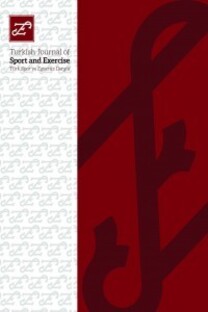The Research On The Negatıve Evaluatıon Anxıety Of Taekwondo Players By Dıfferent Varıables
Social Appearance Anxiety Social Anxiety, Player, Tekvando,
___
- 1. Ahçı H, Gökmen H. Bayan Hentbolcülerde Yarışma Kaygısı, Başarı, Spor Deneyimi ve Atletik Yeterlilik İlişkisi, Spor Bilimleri Dergisi, 1995; 6 (2): 38-47.
- 2. Akçakoyun F, Çalışkan E, Karlı H. Dövüş ve Takım Sporcularının Empati Düzeylerinin Karşılaştırılması, Türkiye Kickboks Federasyonu Spor Bilimleri Dergisi, 2010; 3(2): 37-47.
- 3. Alkan V. Akademik Ortamlarda Olumsuz Değerlendirilme Korkusu Ölçeğinin Geliştirilmesi. Yüksek Lisans Tezi, Ankara Üniversitesi, Ankara, 2015.
- 4. Brumariu LE, Kerns KA. Mother-child Attachment and Social Anxiety Symptoms in Middle Childhood. Journal of Applied Developmental Psychology, 2008; 29(5): 393-402. https://doi.org/10.1016/j.appdev.2008.06.002
- 5. Bruch MA, Heimberg RG. Differences in Perceptions of Parental and Personal Characteristics Between Generalized and Nongeneralized Social Phobics. Journal of Anxiety Disorders, 1994; 8(2): 155-168. https://doi.org/10.1016/0887-6185(94)90013-2
- 6. Çağlar M, Dinçyürek S, Arsan N. Üniversite Öğrencilerinin Sosyal Kaygılarının Analizi. Hacettepe University Journal of Education, 2012; 43: 106-116.
- 7. Çetin B, Doğan T, Sapmaz F, Olumsuz Değerlendirilme Korkusu Ölçeği Kısa Formunun Türkçeye Uyarlaması: Geçerlik ve Güvenirlik Çalışması, Eğitim ve Bilim, 2010; 35 (156): 205-216.
- 8. Çetinkaya T, Honça AA. Beden Eğitimi ve Spor Yüksekokulu Öğrencilerinin Sosyal Kaygı Düzeylerinin Farklı Değişkenler Açısından İncelenmesi. İnönü Üniversitesi Beden Eğitimi ve Spor Bilimleri Dergisi, 2017; 4(2): 13-19.
- 9. Demir T, Demir D, Türksoy N, Özmen E, Uysal Ö. Çocuklar İçin Sosyal Anksiyete Ölçeğinin Geçerlik ve Güvenirliği”, Düşünen Adam, 2001; 13 (1):42-48. 10. Dilbaz N. Sosyal Fobi , Psikiyatri Dünyasi, 1997; 1 :18-24.
- 11. Doğan PK. Examining the Relation Between the Fear of Negative Evaluation and the Anxiety for Social Appearance in Folk Dancers, Journal of Education and Training Studies, 2018; 6(3): 59-65.
- 12. Durak F, Vurgun N. Takım Sporları Açısından Empati ve Takım Birlikteliği İlişkisi, Spormetre Beden Eğitimi ve Spor Bilimleri Dergisi, 2006; 4(2): 73–77.
- 13. Erkan U. Sporcular İçin Zihinsel Antrenör Rehberi, Bağırgan Yayın Evi, Ankara, 1998.
- 14. Hortaçsu N. Çocuklukta İlişkiler- Ana Baba, Kardeş ve Arkadaşlar. İstanbul: İmge kitabevi, 2003.
- 15. Kağıtçıbaşı Ç. İnsan ve İnsanlar (8. Baskı), İstanbul: Evrim; 1988.
- 16. Karabulut EO, Bahadır Z. Assessment of Fear of Negatıve Evaluatıon Levels and Empathıc Tendency Levels of Natıonal Junıor Judo Team. Journal of Physical Education & Sports Science/Beden Egitimi ve Spor Bilimleri Dergisi, 2013; 7(2).
- 17. Keighin M, Butcher K, Darnell M. The Effect of İntroversion and Extraversion on The Fear of Negative Evaluation. Undergraduate Research Journal for the Human Sciences, 2009; 8(1).
- 18. Leary MR. A Brief Version of The Fear of Negative Evaluation Scale. Personality and Social Psychology Bulletin, 1983; 9(3): 371-375. https://doi.org/10.1177/0146167283093007
- 19. Lee MG, Kim YG (207). Effects of Short-Term Weight Loss on Physical Fitness, İsokinetic Leg Strength, and Blood Variables in Male High School Taekwondo Players. The 1st International Symposium for Taekwondo Studies; 2007; 47–57. May 16–17; Beijing, China.
- 20. Ömür YE, Aydın R, Argon T. Olumsuz Değerlendirilme Korkusu ve Akademik Sahtekârlık. Eğitim ve İnsani Bilimler Dergisi, 2014; 5(9): 131-149.
- 21. Çam S, Sevimli D, Yerlikaya E. Olumsuz Değerlendirilmekten Korkma Ölçeği’ne ODKÖ İlişkin Bir Geçerlik Ve Güvenirlik Çalışması. Çukurova Üniversitesi Sosyal Bilimler Enstitüsü Dergisi, 2010; 19(1):132-140.
- 22. Sevimli D. An İnvestigation on The Fear of Negative Evaluation of The Candidates Participating The Private Ability Test Given by The College of Physical Education and Sport. Türkiye Klinikleri Journal of Sports Sciences, 2009; 1(2): 88-94.
- 23. Subaşı G. Ergenlerde Sosyometrik Statü Gruplarına Göre Sosyal Kaygı Farklılıkları ve Akran İlişkileri, Ege Üniversitesi, Eğitim Dergisi, 2009;10 (1):114-136.
- 24. Stopa L, Clark DM. Cognitive Processes in Social Fobia, Behaviour Research and Therapy, 1993; 31(3),:225-267.
- 25. Tavacıoğlu L. Spor Psikolojisi Bilişsel Değerlendirmeler, Bağırgan Yayınevi, Ankara, 1999.
- 26. Yıldırım T, Çırak Y, Konan N. Öğretmen Adaylarında Sosyal Kaygı. İnönü Üniversitesi Eğitim Fakültesi Dergisi, 2011; 12 (1): 85-100.
- Yayın Aralığı: 3
- Başlangıç: 1999
- Yayıncı: Selçuk Üniversitesi, Spor Bilimleri Fakültesi
Reviewing attitudes of women towards leisure activities in terms of different variables
Hüseyin GÜMÜŞ, İrfan YILDIRIM, Çağla AYNA
Murat ATASOY, Ebru Olcay KARABULUT, Levent VAR
Technical analysis of 2007 and 2017 World Taekwondo Women and Men championship finals
Ersin ESKİLER, Oğuzhan DEMİRHAN
Harun GENÇ, Gökmen KILNÇARSLAN, İdris KAYANTAŞ, Akan BAYRAKTAR
Investıgatıon of waıst / heıght ratıo and body mass ındexes of sports centers
